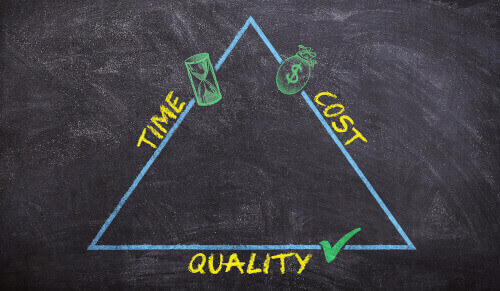- Quality Management - Part 1
- 15. May 2020
Fundamentals of Quality Management Systems
What are the tasks of a quality management system?
The basic idea is to establish a system that enables a constant, iterative increase in quality. This system should prevent that a quality level once reached is "lost" again. It is intended to provide a framework that systematically deals with errors and extracts information that can be used to improve the system.
A QMS provides a framework for action for a company in which products and services should be designed to create a high level of customer satisfaction. Customer satisfaction is linked to the fulfilment of customer requirements, including regulatory requirements.
Which companies need a QMS?
It depends on the industry in which a company is active. In medical technology, for example, a QMS is required by law. In other industries, QM systems are voluntary.
There are also different standards that deal with the specific requirements for QM systems. ISO 13485 is applicable to manufacturers of medical devices and IVDs because it describes requirements that are specific to medical technology. ISO 9001, on the other hand, is applicable to companies of all kinds, because it describes general requirements for QM systems.

What are the challenges facing this department?
There are also different standards that deal with the specific requirements for QM systems. ISO 13485 is applicable to manufacturers of medical devices and IVDs because it describes requirements that are specific to medical technology. ISO 9001, on the other hand, is applicable to companies of all kinds, because it describes general requirements for QM systems.
Medical technology is not only about manufacturing products and services that ensure customer satisfaction. It is about people's health. For this reason, medical technology is also more strongly regulated than other areas and this is reflected in the QM systems of manufacturers.
Many manufacturers of medical devices and IVDs operate internationally. They must therefore also reflect the requirements of various target markets in their QM systems. This requires a lot from the responsible employees, because they have to determine all applicable requirements and implement them in the QMS. In certain countries, however, it is not at all easy to determine all applicable requirements if the local language is not spoken.
Quality management in medical technology is also subject to regular audits by notified bodies and authorities. These audits are an additional safety factor to enforce the high quality standards of the industry.
What are the challenges facing this department?
There is a challenge that exists in almost all companies in connection with quality management: The lack of awareness of the importance of the QMS and the lack of understanding of the requirements are points that we regularly observe in the industry.
In addition, the fear of errors is very common in QM. After all, one is QM and does not make mistakes. After all, one is the party that provides a framework for others to make no or fewer mistakes. From a QM point of view, errors are often equated with a loss of face. But this is exactly the first big mistake! This attitude sometimes leads to regulatory and normative requirements being interpreted with a strictness that is not necessary. It leads to QM systems being unnecessarily inflated and the amount of work involved rising disproportionately in relation to the benefits.
If quality management is done right, it is a blessing. If it is done wrong, it is a curse. QM should always be done for the company itself and not for the notified body or authority.
- thinqbetter
What does thinqbetter advise?
If you are in the process of setting up a QMS, make sure you involve experts. Make sure that these people are able to build a QMS for your company. A QMS should be tailor-made and individual. It must serve your purposes while ensuring that you meet the applicable requirements.
A QMS should not be primarily designed to implement requirements and you must then integrate your way of working into that QMS. This creates resentment, friction and frustration - and rightly so!
Especially the errors in the very early phases of QMS creation can hardly be eliminated later. Therefore, involve experts and all persons involved from the very beginning. Build up the QMS step by step and at the same time build up understanding within your company. A good mutual understanding is an important pillar of efficient cooperation.
Prevent employees in your company from developing an aversion to QM by dealing with the topic correctly from the very beginning. Your QMS will accompany you permanently - you wouldn't marry someone you can' t stand, would you?